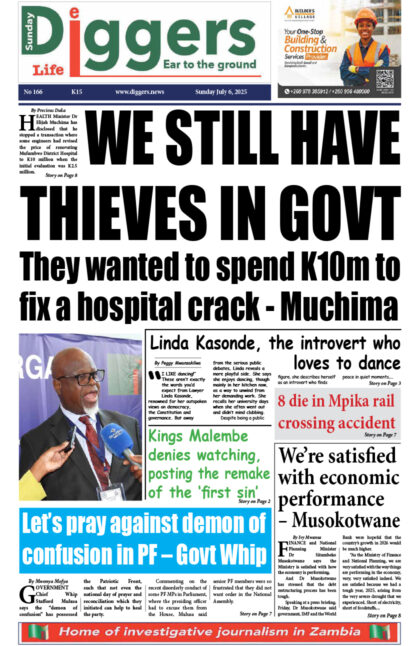THE Court of Appeal has declined to grant Musicians Chama Fumba, alias Pilato, Maiko Zulu, Brian Bwembya and two others leave to commence Judicial Review proceedings against ECZ’s decision to conduct a fresh registration of all eligible voters for the upcoming 2021 general elections within a period of one month and on a limited budget.
On September 29, this year, Lusaka High Court judge Gertrude Chawatama refused to grant Pilato and the others leave to commence Judicial Review proceedings against the said decision by the Electoral Commission of Zambia.
Judge Chawatama said in her ruling that the reliefs which Pilato and the others were seeking were similar to those in another case where UPND deputy secretary general Gertrude Imenda has sued ECZ over its decision to commence online voter registration without authority of law and further, to give a 30 days cut-off time for the voter registration.
She said allowing the proceedings to proceed might lead to conflicting decisions by herself and High Court judge Mwila Chitabo who is presiding over the UPND matter, a situation that would bring the integrity of the court into disrepute.
And October 1, this year, the said matter before judge Chitabo was adjourned sine die following an agreement by the parties.
Judge Chitabo ruled that the matter would stand adjourned sine die with liberty to restore, awaiting pronouncements from the Constitutional Court in a matter in Chapter One Foundation Limited has petitioned the ConCourt, seeking an order mandating ECZ to carry out continuous voter registration between elections.
However, on October 5, this year, Pilato and the others renewed their application for leave to apply for judicial review before the Court of Appeal in respect of the decision by ECZ to require currently validly registered voters in terms of the law to participate in a process that amounts to requiring them to re-register as voters in a period of one month.
They cited ECZ as the respondent.
Pilato, Maiko, Bwembya aka B Flow and two youths: Nawa Sitali and Muleta Kapatiso, on behalf of the people, were seeking an order quashing ECZ’s decision for being irrational, procedurally improper and illegal and an order, compelling ECZ to re-take its decision and act within the powers vested in them by the law.
They further wanted if leave is granted, hearing of the Judicial Review application should be expedited and that it should operate as a stay of ECZ’s decision which requires already registered voters to present themselves before a registration officer again or be precluded or prevented from voting in the 2021 general elections.
The applicants argued that the decision by ECZ which required currently validly registered voters in terms of the law to participate in a process that amounts to re-registration of voters in a period of one month was illegal.
They further argued that there was clearly a good arguable case worth full investigation at the substantive hearing of the application for judicial review, and therefore, they ought to be granted leave to commence judicial review proceedings.
But ECZ opposed to the renewed application for judicial review, arguing that Pilato and the others were prematurely before the Court of Appeal as ECZ was guided by the Electoral Process Act in carrying out the voter registration exercise and the law provides for a redress mechanism for persons aggrieved with the registration process.
It asked the court to dismiss the application for leave to commence judicial review, with costs.
However, when the matter came up for hearing of the renewed application for judicial review yesterday before Court of Appeal judges, Justin Chashi, Petronella Ngulube and Florence Lengalenga, the applicants through their lawyers Mutembo Nchito and Musa Mwenya, State Counsel, insisted that their renewed application for leave to commence judicial review should be granted.
But ECZ through its counsel, Bob Musenga asked the court to dismiss the application with costs arguing that the applicants were prematurely before court as they had not explored numerous avenues which were available to them within the electoral laws.
And in a ruling delivered the same day, the three Court of Appeal judges declined to grant the applicants leave to commence judicial review, saying if they were to grant the application, they could end up having three cases; before the High Court, Constitutional Court and Court of Appeal bordering on similar issues.
Judge Chashi who delivered the ruling on behalf of the other two judges said each party would bear their own costs.
And in a Facebook posting, Pilato said they would pursue every route possible to defend democracy.
“The Court of Appeal has maintained the decision made by the High Court and has since indicated that we join the already existing cases before the High Court. We will pursue every route possible to defend our democracy and our constitution. To assume that we will give up is a liability for anyone,” stated Pilato.



















